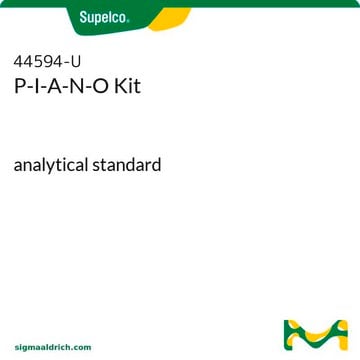All Photos(1)
About This Item
Linear Formula:
C2H5CO2(CH2)3CH3
CAS Number:
Molecular Weight:
130.18
EC Number:
MDL number:
UNSPSC Code:
12352100
PubChem Substance ID:
NACRES:
NA.22
Recommended Products
vapor density
4.5 (vs air)
Quality Level
Assay
99%
form
liquid
autoignition temp.
799 °F
refractive index
n20/D 1.401 (lit.)
bp
145 °C/756 mmHg (lit.)
density
0.875 g/mL at 25 °C (lit.)
SMILES string
CCCCOC(=O)CC
InChI
1S/C7H14O2/c1-3-5-6-9-7(8)4-2/h3-6H2,1-2H3
InChI key
BTMVHUNTONAYDX-UHFFFAOYSA-N
Looking for similar products? Visit Product Comparison Guide
General description
The isothermal vapor–liquid equilibrium for propionic acid and butyl propionate was studied. The rate co-efficient for the gas-phase reaction of butyl propionate with OH radical was studied by both absolute and relative methods.
Signal Word
Warning
Hazard Statements
Precautionary Statements
Hazard Classifications
Flam. Liq. 3
Storage Class Code
3 - Flammable liquids
WGK
WGK 1
Flash Point(F)
100.4 °F
Flash Point(C)
38 °C
Personal Protective Equipment
dust mask type N95 (US), Eyeshields, Gloves
Choose from one of the most recent versions:
Already Own This Product?
Find documentation for the products that you have recently purchased in the Document Library.
Customers Also Viewed
Hong-Sheng Pan et al.
Journal of chemical ecology, 47(1), 87-98 (2021-01-07)
Plant-derived volatiles play a significant role in host selection of phytophagous insects, but their role in seasonal host shifts remain unclear. The polyphagous mirid bug Apolygus lucorum displays marked seasonal host alternation. During summer, volatiles from flowering plants play a
Kai Craenen et al.
Frontiers in behavioral neuroscience, 14, 609660-609660 (2021-01-26)
Previous studies suggested a causal link between pre-natal exposure to ionizing radiation and birth defects such as microphthalmos and exencephaly. In mice, these defects arise primarily after high-dose X-irradiation during early neurulation. However, the impact of sublethal (low) X-ray doses
Multiphase equilibria for binary and ternary mixtures containing propionic acid,< i> n</i>-butanol, butyl propionate, and water.
Fluid Phase Equilibria, 216(2), 219-228 (2004)
M I Banton et al.
Journal of toxicology and environmental health. Part A, 61(2), 79-105 (2000-10-14)
Two inhalation studies were conducted to evaluate the possible subchronic and developmental toxic effects of n-butyl propionate. In the subchronic study, Sprague-Dawley rats (15/sex/group) were exposed to 0, 250, 750, or 1500 ppm vapor for 6 h/d, 5 d/wk for
Peng Liang et al.
Chemphyschem : a European journal of chemical physics and physical chemistry, 11(18), 4097-4102 (2010-08-19)
Rate coefficients for the gas-phase reactions of OH radicals with n-propyl butyrate (k(1)), n-butyl propionate (k(2)) and n-butyl butyrate (k(3)) are measured by both absolute and relative methods. The kinetics data obtained over the temperature range 273-372 K are used
Our team of scientists has experience in all areas of research including Life Science, Material Science, Chemical Synthesis, Chromatography, Analytical and many others.
Contact Technical Service
















